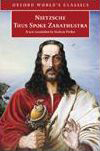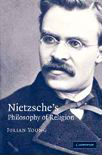- Home
- The Agonist
- Current Issue
- VOLUME VI, ISSUE I & II, SPRING & FALL 2013
VOLUME VI, ISSUE I & II, SPRING & FALL 2013
-
From the Eternal Recurrence to the Posthuman Multiverse
By Francesca Ferrando
You may download the entire book review as Adobe PDF format clicking PDF icon on the left. If you need some clarifications about copyright or usage rights, please contact us at nceditors@ietzschecircle.com.
A quick preview of essay...
SPACETIME
I had a dream. One day in 2010, I woke up with this phrase in my mind: “You will be able to unravel time”. I had never heard the word “unravel” before, so I looked it up in the dictionary to see if it held any meaning: it did. It meant: to undo, to untangle, to solve. And still, what did that phrase mean? How could you unravel time? By only focusing on the “how”, I had no answer. So I changed my focus to the “what”: what is time? Time can be perceived as a human concept, a historical guideline, a cultural framework; and still, time cannot be discerned from space. According to Einstein's general relativity (1916), the concept of time depends on the spatial referential frame of the observer. Time should be addressed more specifically as spacetime. Before proceeding further, we should mention that spacetime is merely a convenient framework; it does not describe “what it really is”, but “what it is like”. In physics, spacetime refers to a mathematical model that combines space and time into a single continuum: time is added as a dimension of space[1]. For instance, due to a principle of physics known as time dilation (Einstein 1916), astronauts in space are aging a bit more slowly than the people on earth. It is assumed that spacetime is curved (Wald 1994)[2]; such a curvature would be caused by the presence of matter, and would be responsible for gravity. And still... what does spacetime have to do with Nietzsche?
ETERNAL RECURRENCE
“Thus Spoke Zarathustra: All that is straight lies,” the dwarf murmured contemptuously. “All truth is crooked; time itself is a circle.“
“You spirit of gravity,” I said angrily, “do not make things too easy for yourself!” (…)“
““Behold,” I continued, “this moment! From this gateway, a long eternal lane leads backward: behind us lies an eternity. (…) Must not whatever can happen have happened, have been done, have passed by before? And if everything has been there before – what do you think, dwarf, of this moment? (…) Must we not eternally return? “
(Z: 3 “On the Vision and the Riddle”, p. 271)
I first engaged with Nietzsche's notion of the eternal recurrence when I was sixteen years old: the idea that each and every moment of my life could return eternally as the same, changed my life at the time, inspiring me to craft my existence as my most ambitious work of art, to which I could say “yes” eternally. As many Nietzsche's scholars, he eternal return as a thought experiment, and I must admit that, at first, I was surprised when I realized that Nietzsche might have conceived it as a cosmological doctrine as well. Here, I will not enter the debate on whether he actually meant to present the eternal recurrence in one way or in both ways (Loeb 2012)[3], but I would like to reflect on possible interpretations of it and take it as an inspiration to develop posthuman cosmo-ontological hypothesis, based on contemporary developments in the fields of quantum physics. I would also like to remark that I will only refer to Nietzsche's Thus Spoke Zarathustra, instead of other possible texts and passages on the eternal recurrence (such as his famous presentation in The Gay Science, 341), not only for an internal coherence of the present text, but more appropriately, for the extensive development of the subject and its visionary approach in Nietzsche's most poetic work, which perfectly suits the evocative purpose of this account.
As a cosmological pattern, the eternal recurrence can be traced back to Eastern philosophies and spiritual traditions related to Buddhism as well as Hinduism; within Western philosophy, we can see antecedents in Heraclitus, the Stoic philosopher Zeno, and in the Pythagorean tradition – all sources which Nietzsche was familiar with (Bishop 2004; Parkes 1991; Mistry 1987)[4]. Some other interpretations of the eternal recurrence can be found in different cosmogonic rituals around the world. For instance, Mircea Eliade, in The Myth of the Eternal Recurrence (1949) underlines how ancient societies tended to envisage events not as constituting a linear, progressive history, but as creative repetitions of primordial archetypes. In Eliade's words:
“These “rituals imitate a divine archetype and their continual reactualization takes place in one and the same atemporal mythical instant. However, the construction rites show us something beyond this (…). Every construction is an absolute beginning; that is, tends to restore the initial instant, the plenitude of a present that contains no trace of history. (1949: 76).“
How could a moment contain the present, the past and the future at the same time?
Thus Spoke Zarathustra:
“Eternally the ring of being remains faithful to itself. In every Now being begins; round every Here rolls the sphere There. The center is everywhere. Bent is the path of eternity. (Z: 3, “The Convalescent”,33).“
The moment is the matrix of creation: most patterns of existence will be repeated insuring continuity, some will be slightly modified, and a few might be radically revisited. Oral historical matriarchal lineages of time and herstories of bodies are also precious sources to be investigated. For instance, Julia Kristeva, in her essay “Women's Time” (1979)[5], argues that female subjectivity is divided between cyclical, natural time (repetition, gestation, menstruation) and monumental time (eternity, myth of resurrection, the cult of maternity). She is actually pointing out to Nietzsche as her direct source for such a definition of temporal dimensions.[6]These modalities are set off against the time of linear history from where women have been the casualties, the outsiders of the socio-symbolic time contract.
to continue reading, download entire essay as Adobe PDF format ...
The Agonist
-
Thus Spoke ZarathustraBy Friedrich NietzscheA new translation by Graham Parkes
Oxford University Press, 2005
Reviewed by Horst HutterThis new translation of Nietzsche’s magnum opus is by far the best available in the English language. It should find its way to the desk of all students who do not have access to the original German.
-
Nietzsche’s Philosophy of ReligionBy Julian YoungCambridge University Press, 2006
Reviewed by Horst Hutter,
Concordia UniversityEvery student of Nietzsche in the Anglophone world should read this book. It is a most able treatment of a much-ignored and much-misunderstood topic close to the very heart of the writings of this seminal thinker.
Support Us
Please consider donating! The NC is a not-for-profit organization. As an independent organization that receives no assistance from any institution, the NC relies on your magnanimity to sustain itself. Please help support the activities of the NC with a donation Donations of any kind, whether of money, services, equipment, or in-kind gifts, are all of great necessity and deeply appreciated.
Subscribe
To receive site updates, news, and announcement from NC via email. To do so, you simply need to provide your email address below.





